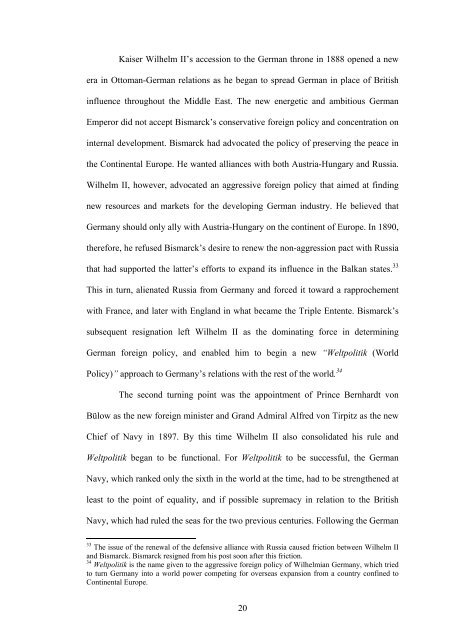the beginnings of ottoman-german partnership - Bilkent University
the beginnings of ottoman-german partnership - Bilkent University
the beginnings of ottoman-german partnership - Bilkent University
You also want an ePaper? Increase the reach of your titles
YUMPU automatically turns print PDFs into web optimized ePapers that Google loves.
Kaiser Wilhelm II’s accession to <strong>the</strong> German throne in 1888 opened a new<br />
era in Ottoman-German relations as he began to spread German in place <strong>of</strong> British<br />
influence throughout <strong>the</strong> Middle East. The new energetic and ambitious German<br />
Emperor did not accept Bismarck’s conservative foreign policy and concentration on<br />
internal development. Bismarck had advocated <strong>the</strong> policy <strong>of</strong> preserving <strong>the</strong> peace in<br />
<strong>the</strong> Continental Europe. He wanted alliances with both Austria-Hungary and Russia.<br />
Wilhelm II, however, advocated an aggressive foreign policy that aimed at finding<br />
new resources and markets for <strong>the</strong> developing German industry. He believed that<br />
Germany should only ally with Austria-Hungary on <strong>the</strong> continent <strong>of</strong> Europe. In 1890,<br />
<strong>the</strong>refore, he refused Bismarck’s desire to renew <strong>the</strong> non-aggression pact with Russia<br />
that had supported <strong>the</strong> latter’s efforts to expand its influence in <strong>the</strong> Balkan states. 33<br />
This in turn, alienated Russia from Germany and forced it toward a rapprochement<br />
with France, and later with England in what became <strong>the</strong> Triple Entente. Bismarck’s<br />
subsequent resignation left Wilhelm II as <strong>the</strong> dominating force in determining<br />
German foreign policy, and enabled him to begin a new “Weltpolitik (World<br />
Policy)” approach to Germany’s relations with <strong>the</strong> rest <strong>of</strong> <strong>the</strong> world. 34<br />
The second turning point was <strong>the</strong> appointment <strong>of</strong> Prince Bernhardt von<br />
Bülow as <strong>the</strong> new foreign minister and Grand Admiral Alfred von Tirpitz as <strong>the</strong> new<br />
Chief <strong>of</strong> Navy in 1897. By this time Wilhelm II also consolidated his rule and<br />
Weltpolitik began to be functional. For Weltpolitik to be successful, <strong>the</strong> German<br />
Navy, which ranked only <strong>the</strong> sixth in <strong>the</strong> world at <strong>the</strong> time, had to be streng<strong>the</strong>ned at<br />
least to <strong>the</strong> point <strong>of</strong> equality, and if possible supremacy in relation to <strong>the</strong> British<br />
Navy, which had ruled <strong>the</strong> seas for <strong>the</strong> two previous centuries. Following <strong>the</strong> German<br />
33 The issue <strong>of</strong> <strong>the</strong> renewal <strong>of</strong> <strong>the</strong> defensive alliance with Russia caused friction between Wilhelm II<br />
and Bismarck. Bismarck resigned from his post soon after this friction.<br />
34 Weltpolitik is <strong>the</strong> name given to <strong>the</strong> aggressive foreign policy <strong>of</strong> Wilhelmian Germany, which tried<br />
to turn Germany into a world power competing for overseas expansion from a country confined to<br />
Continental Europe.<br />
20
















